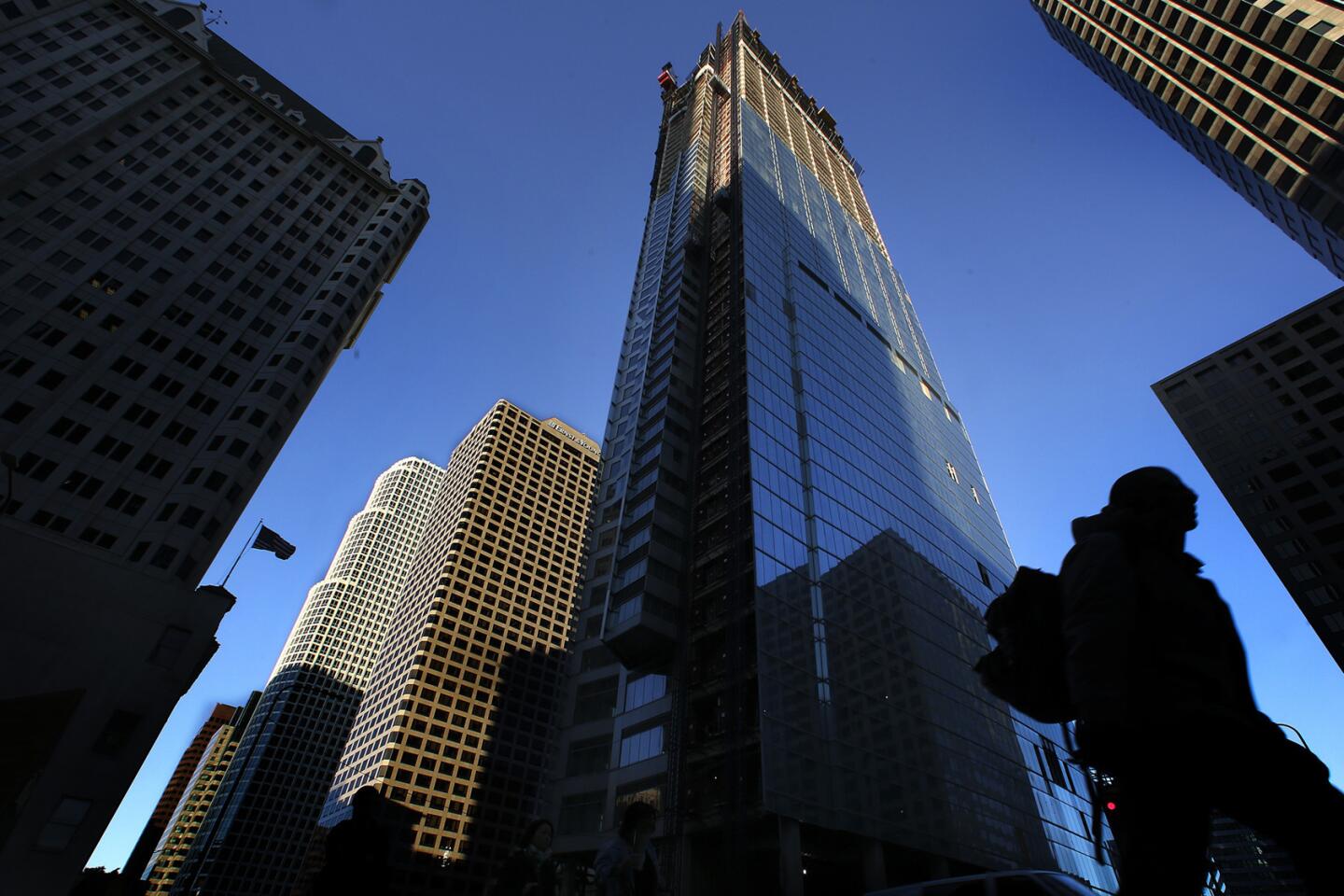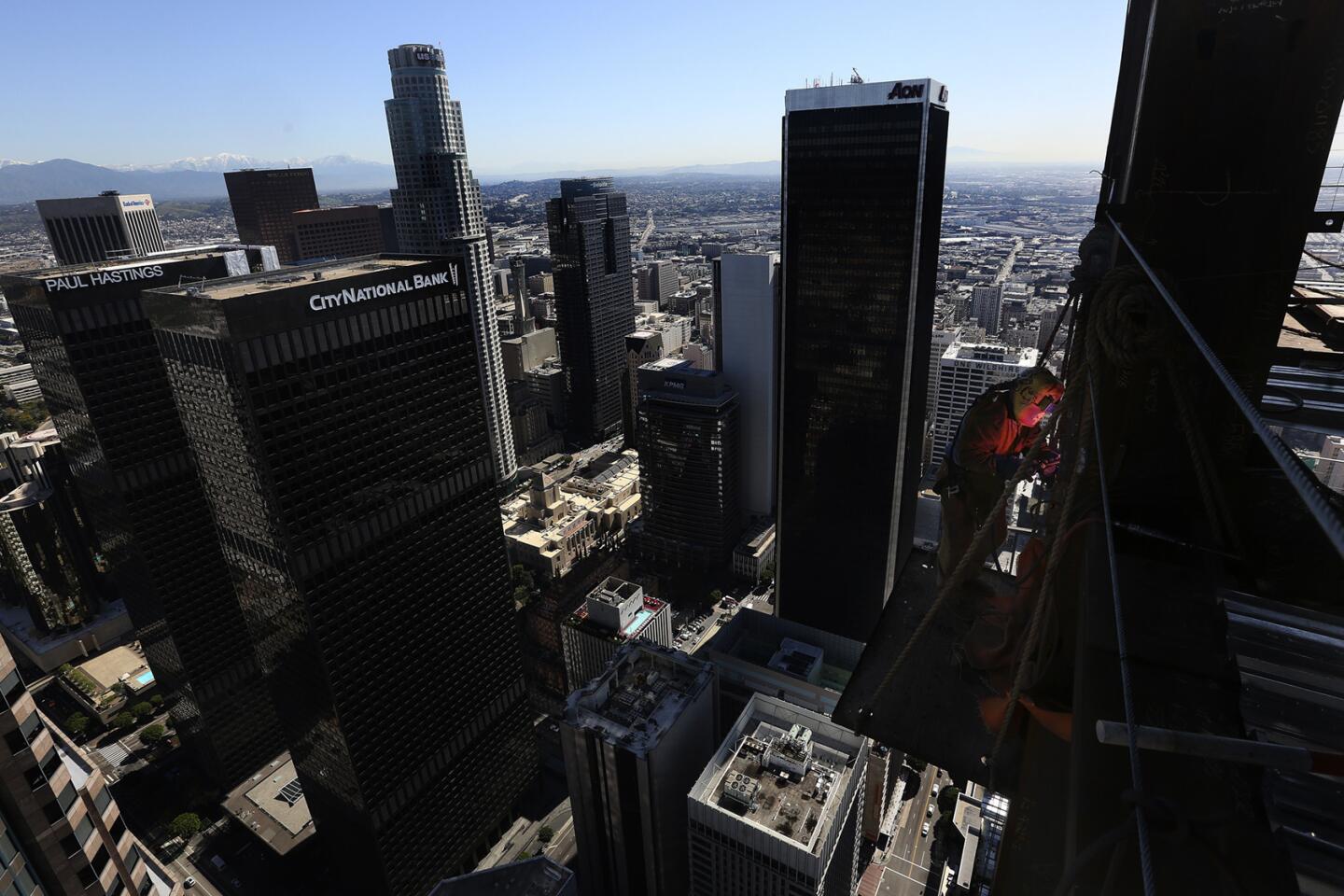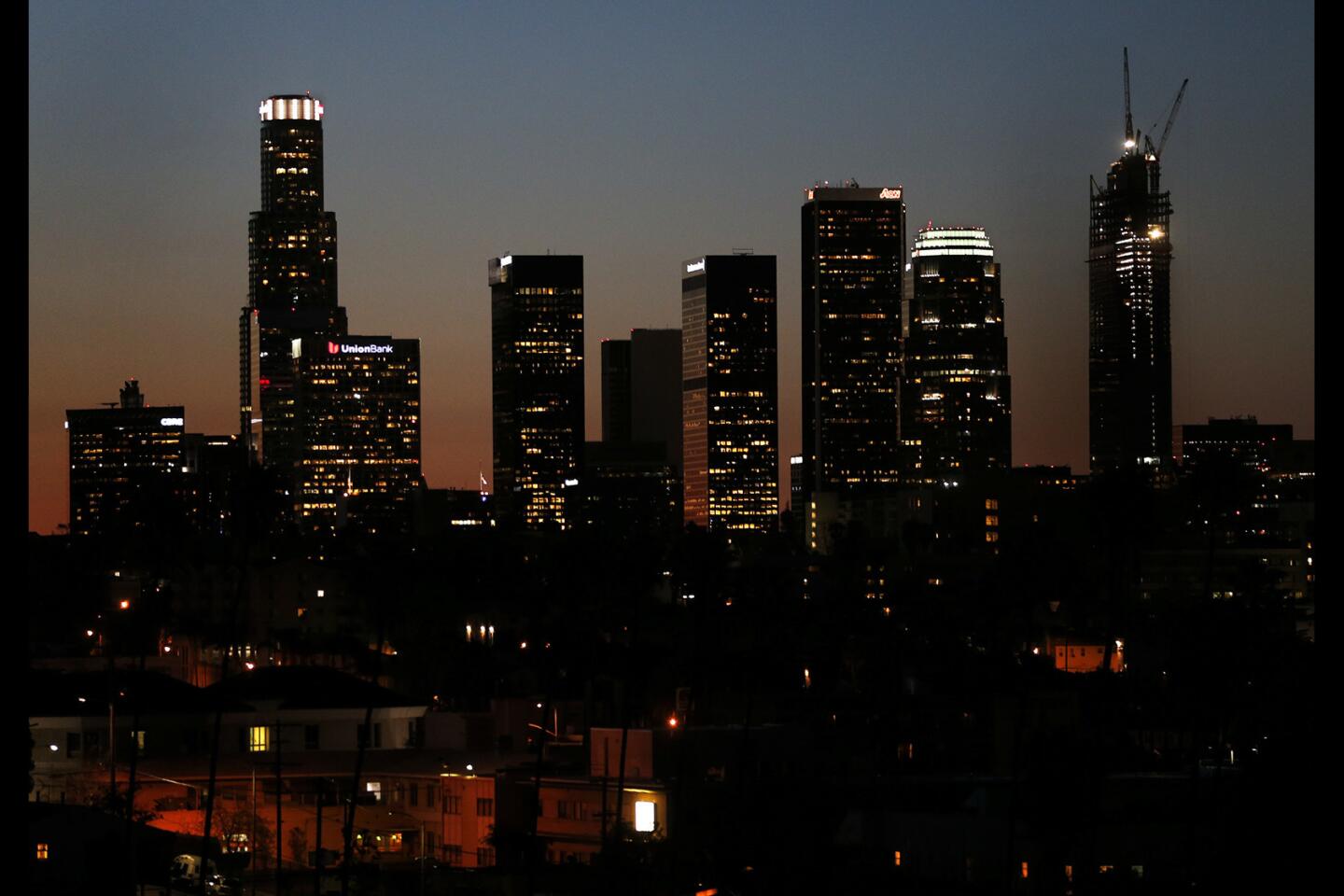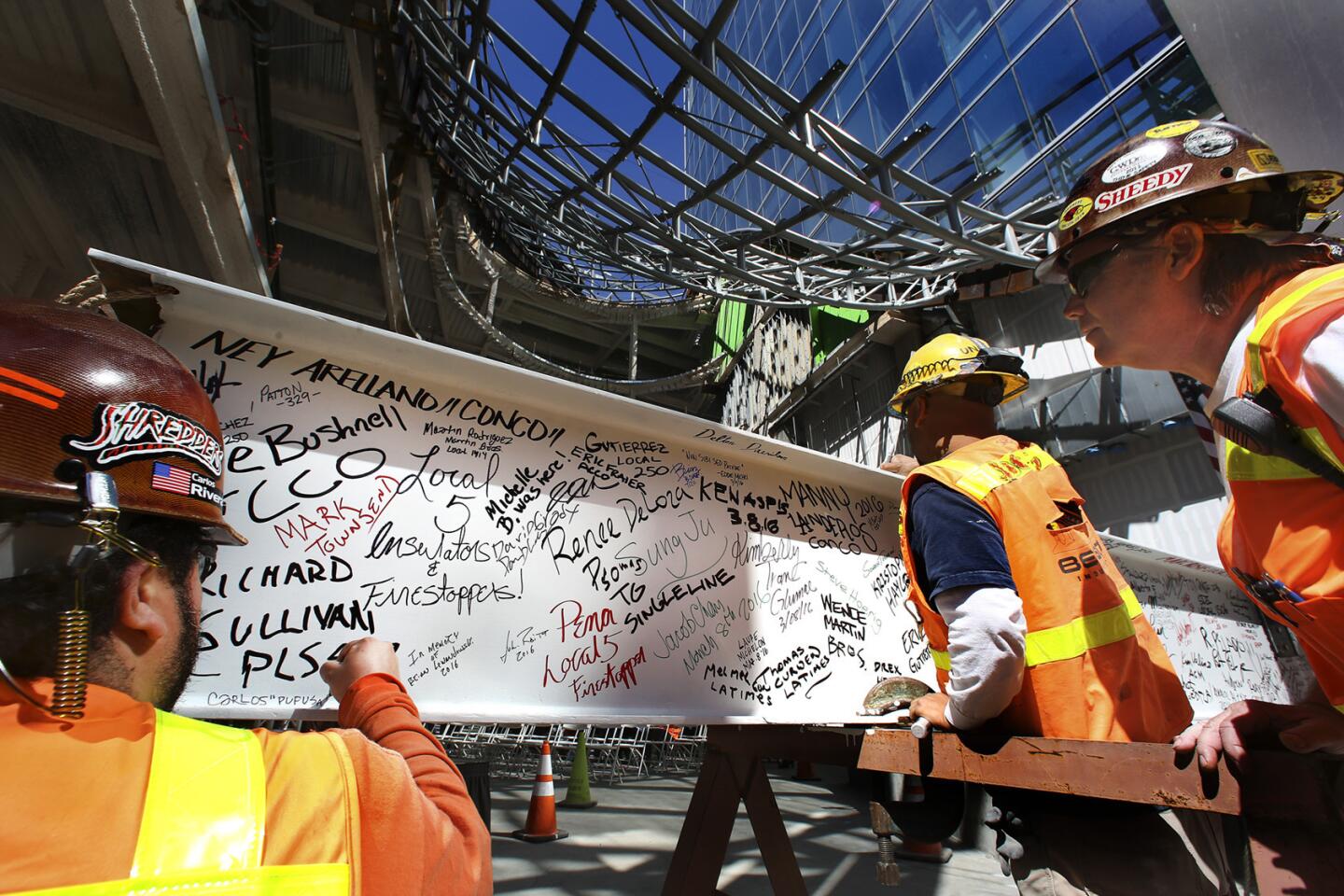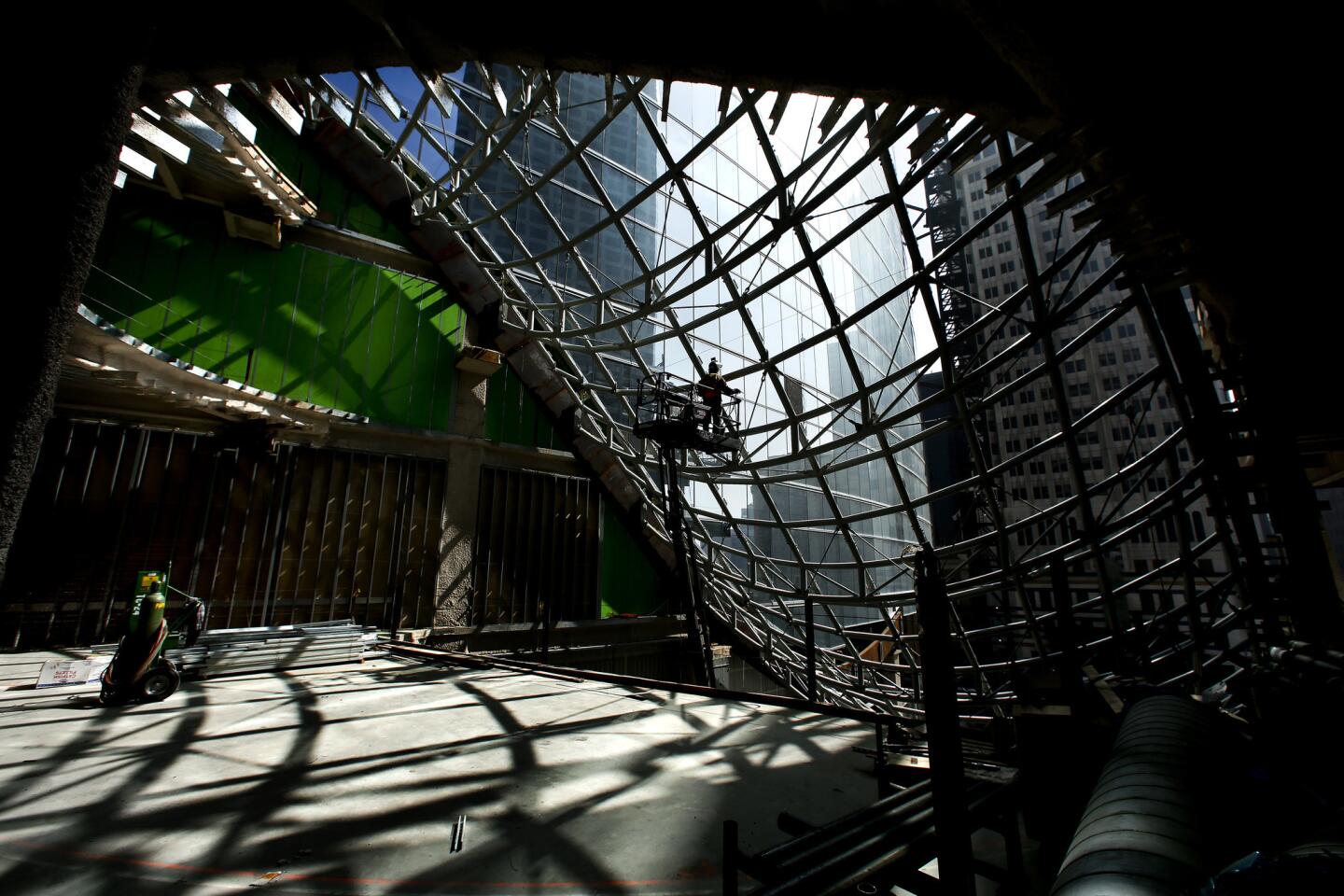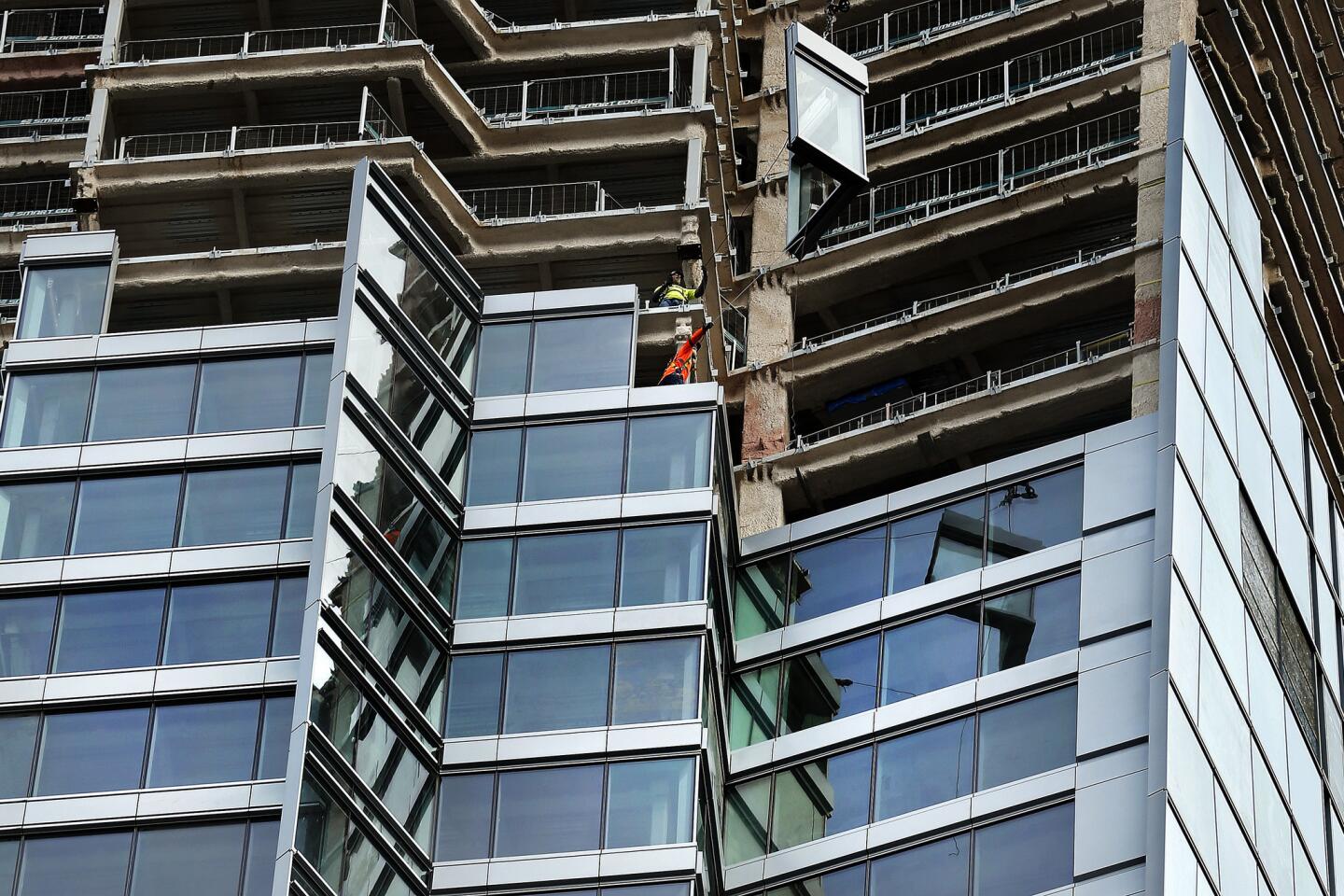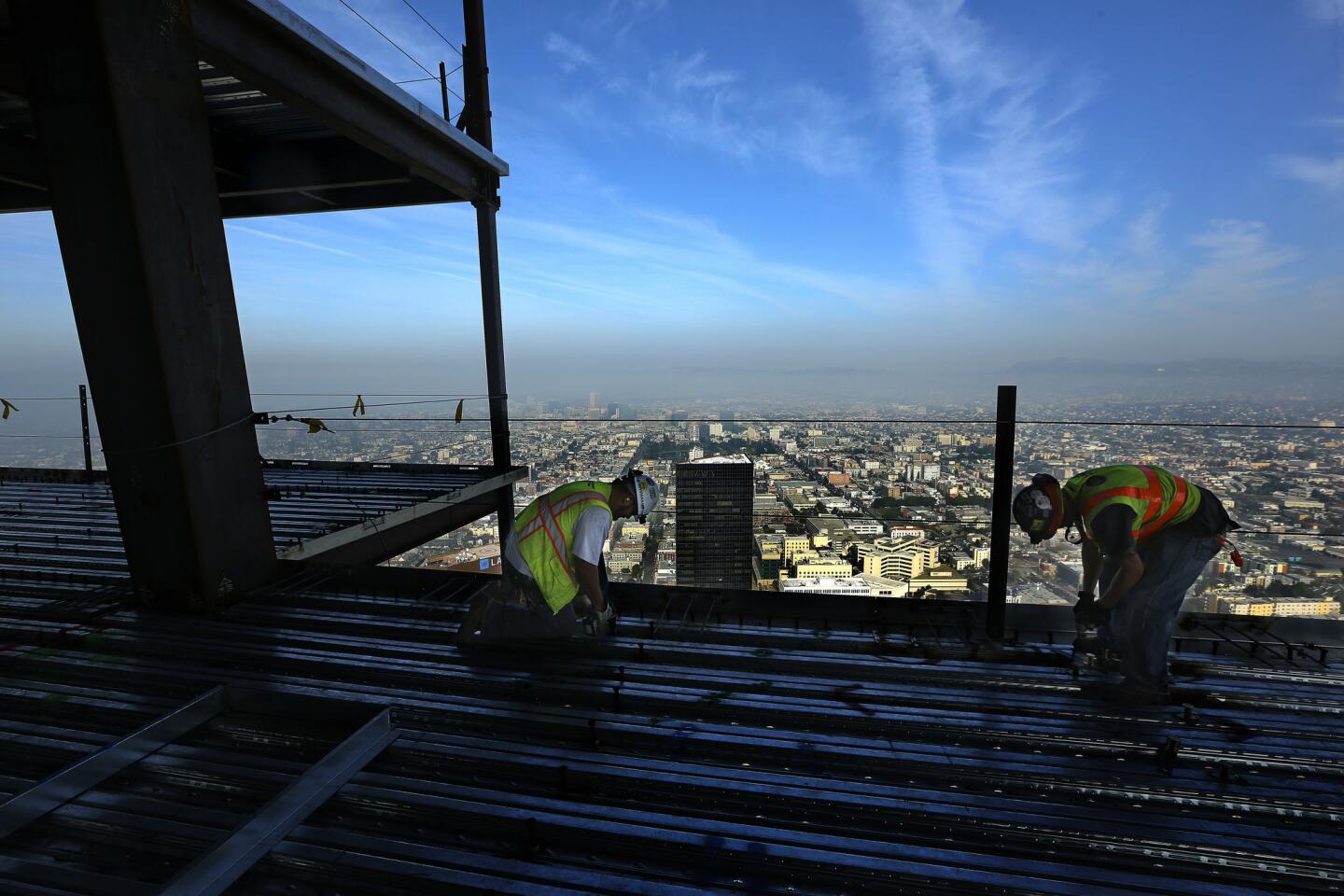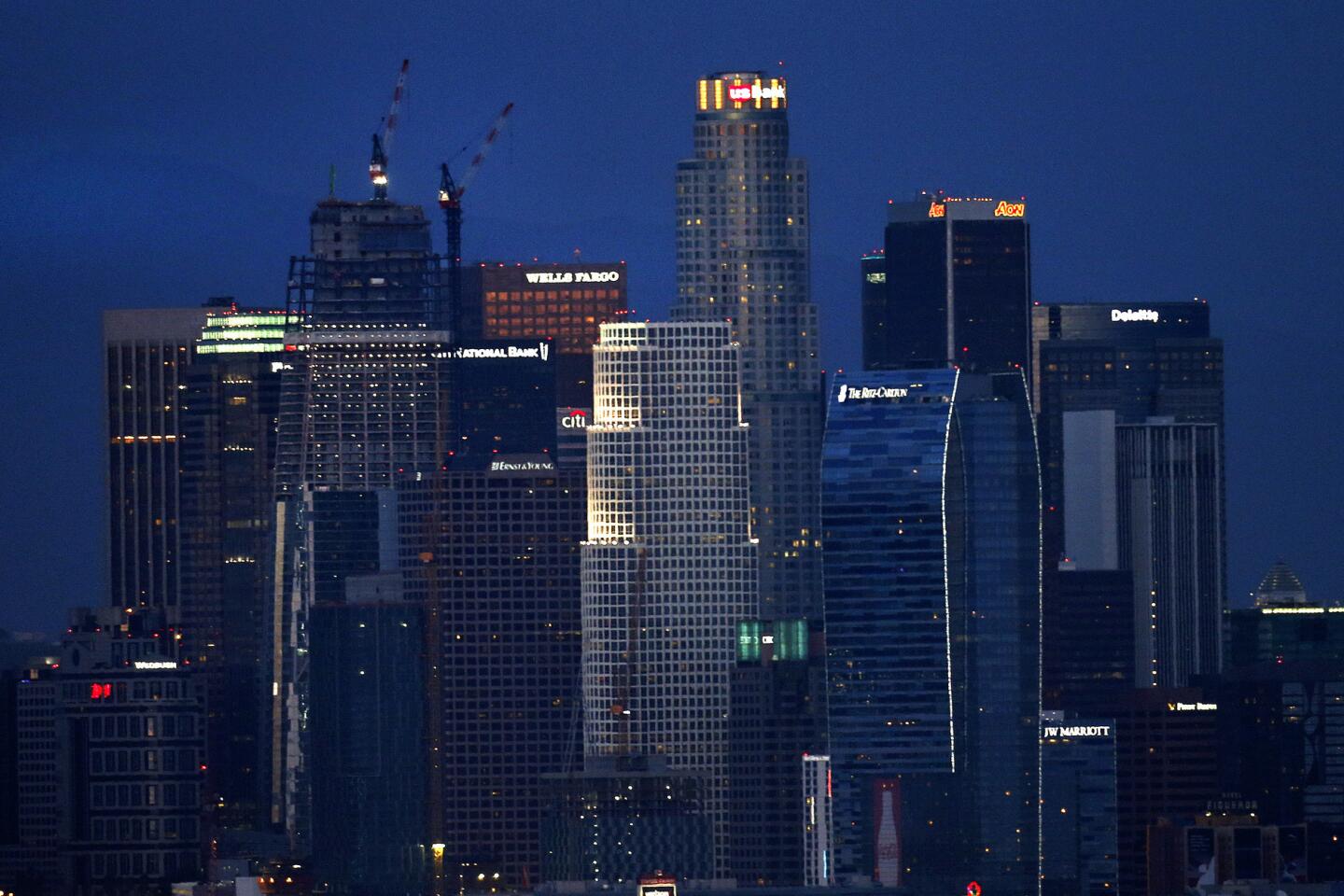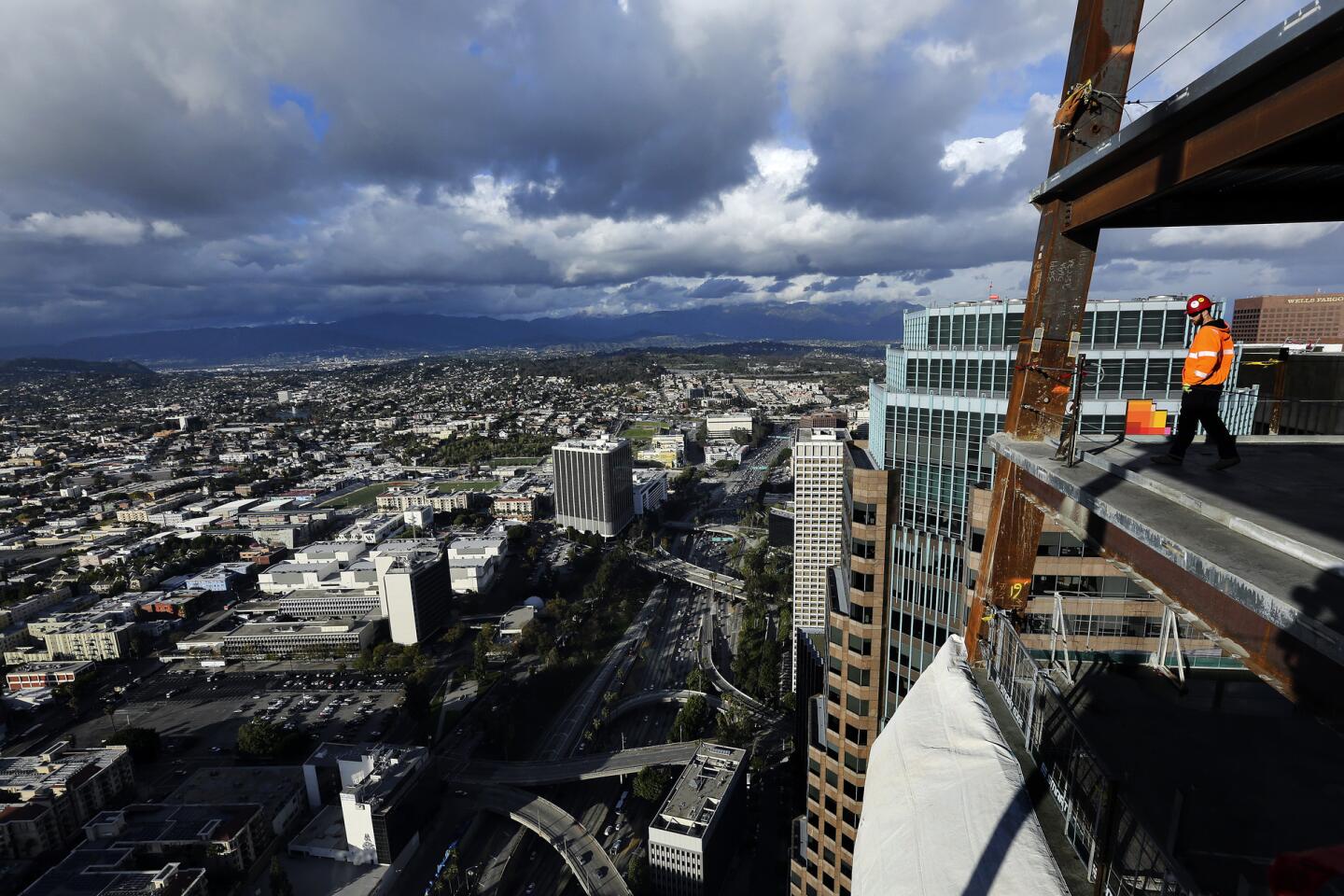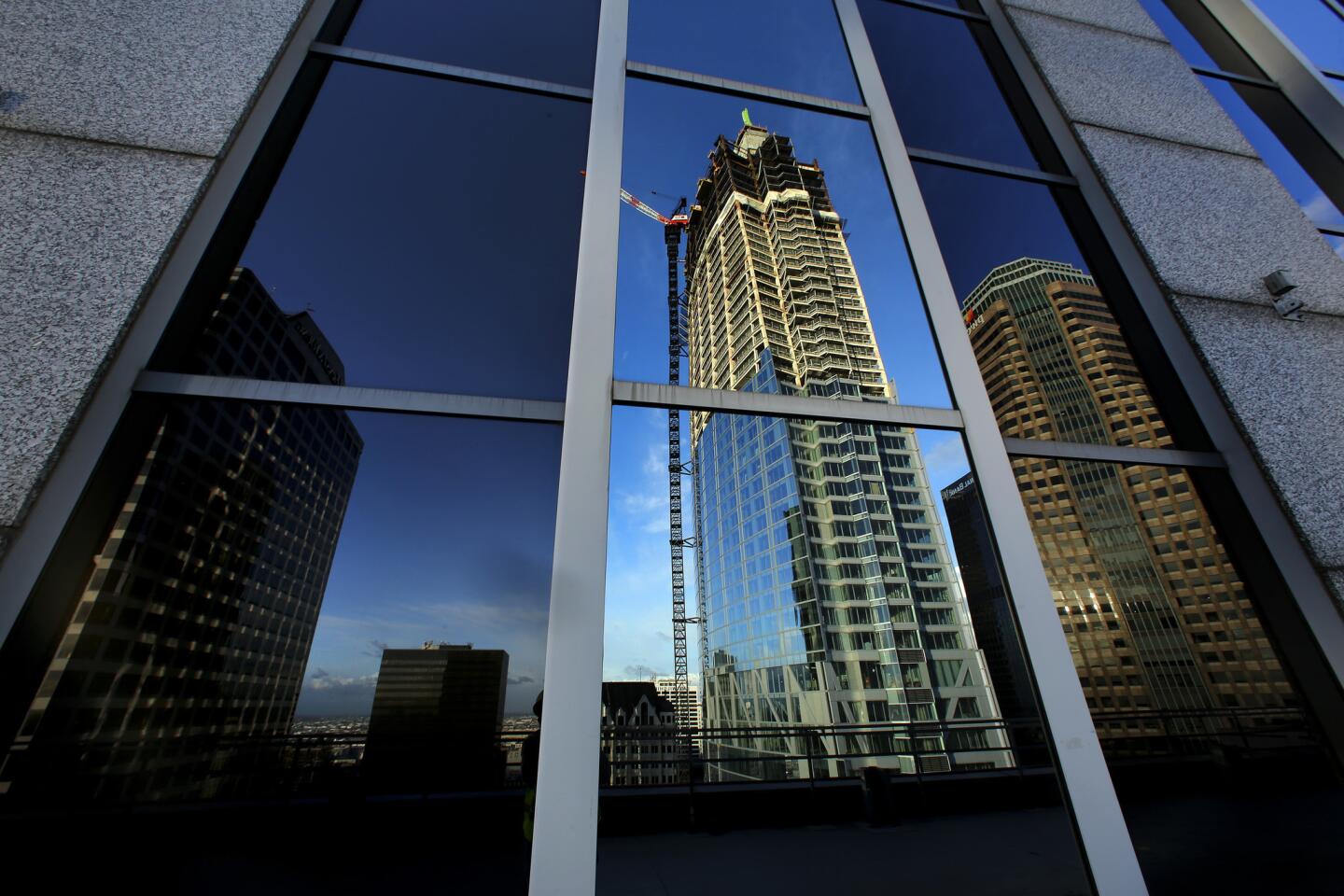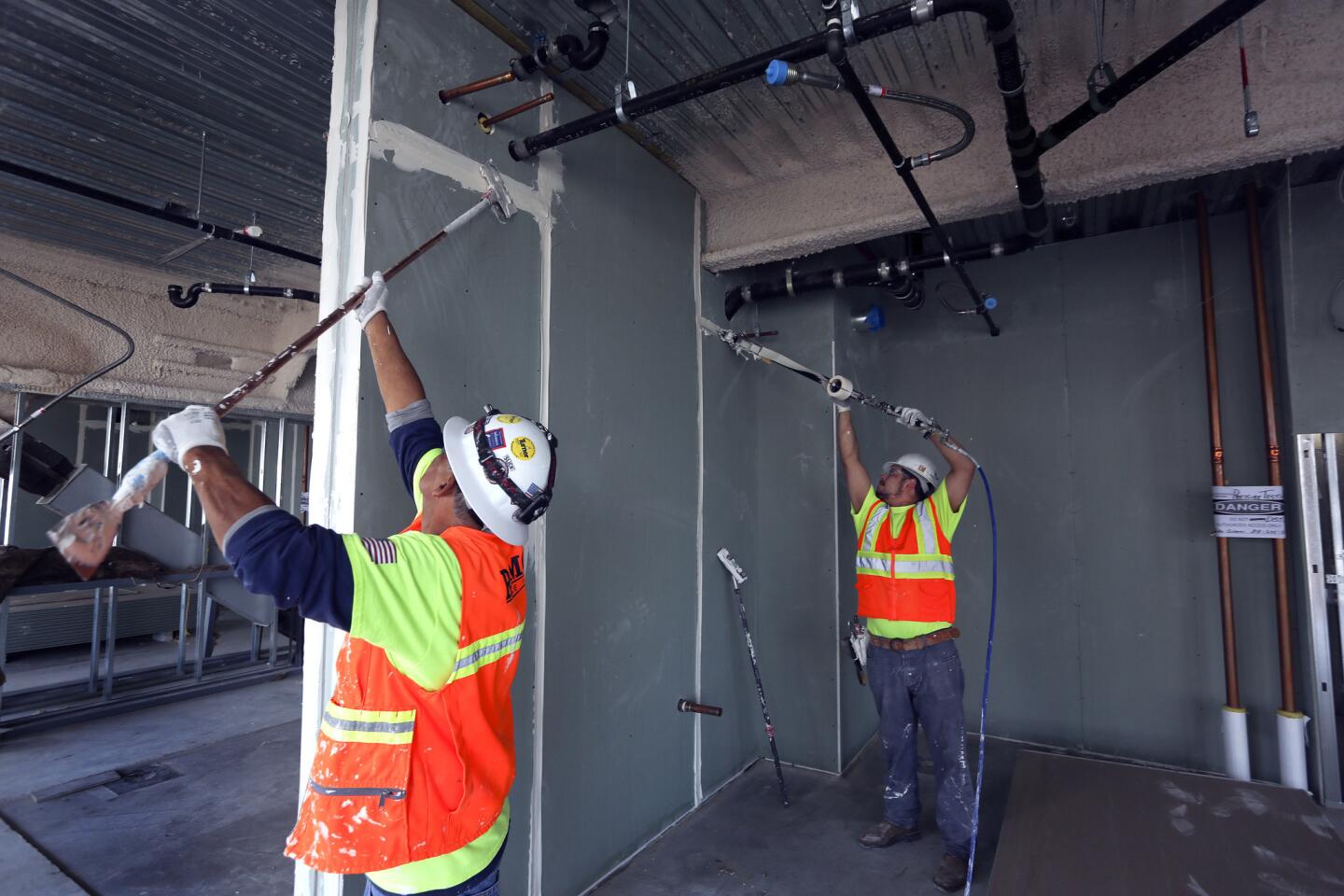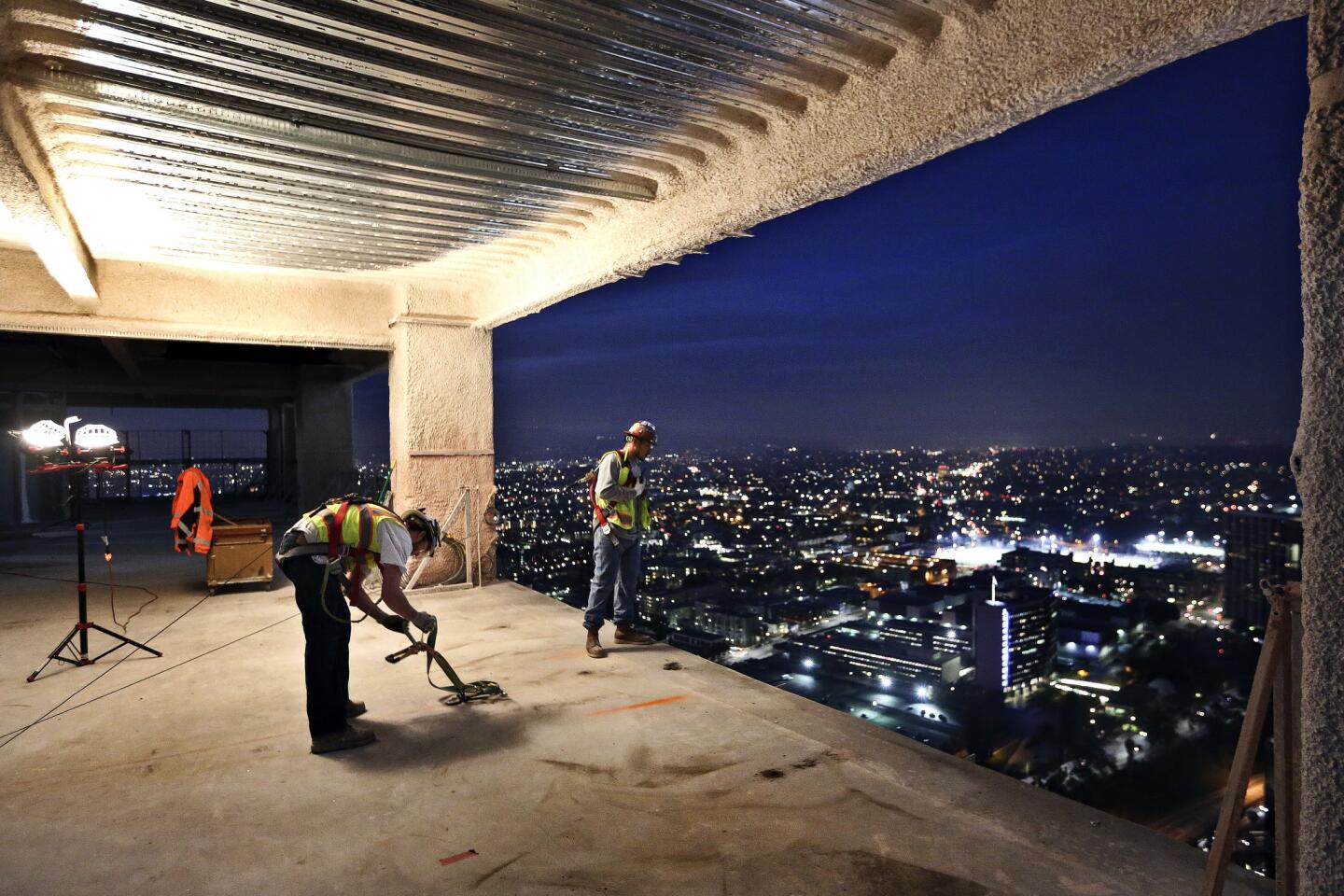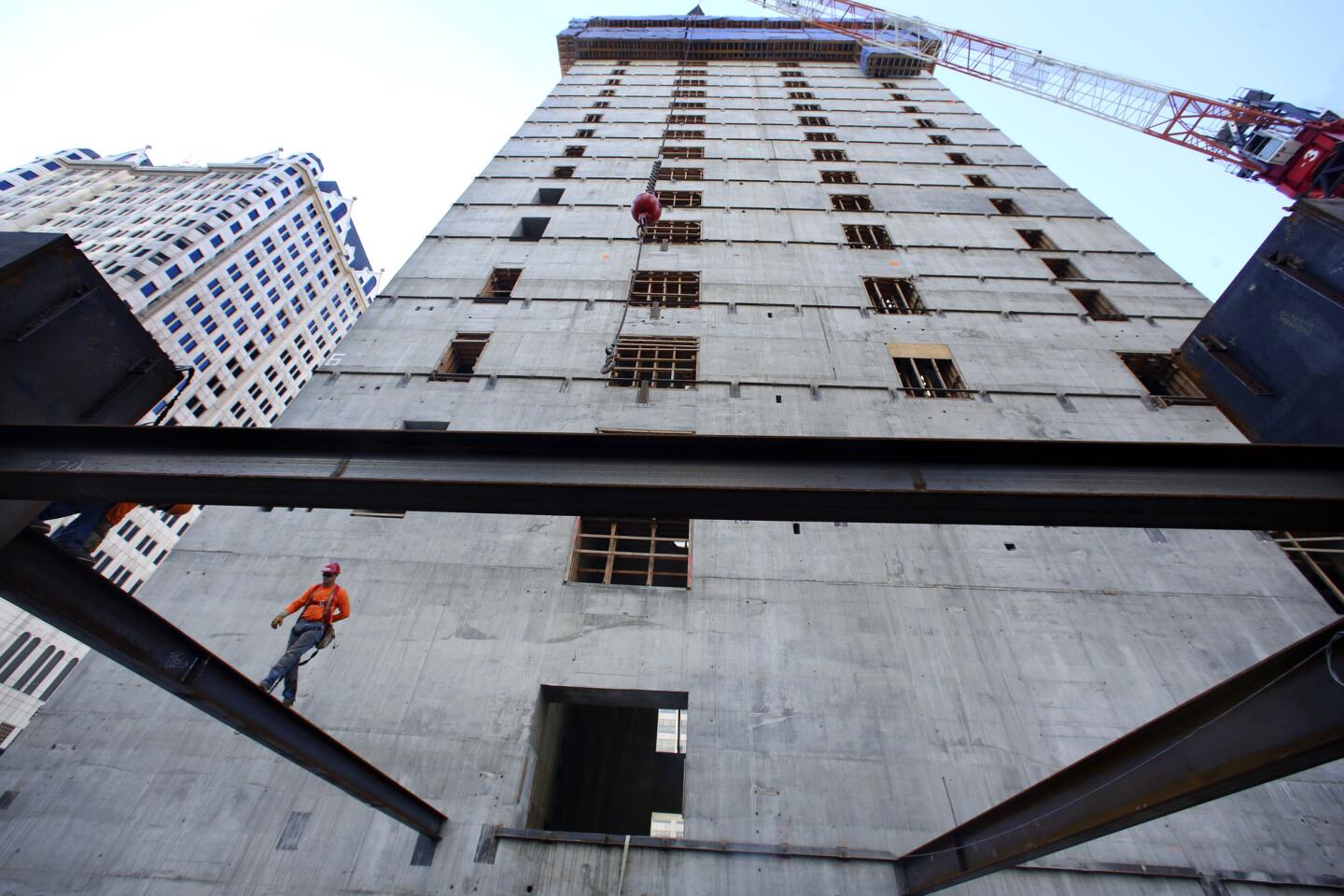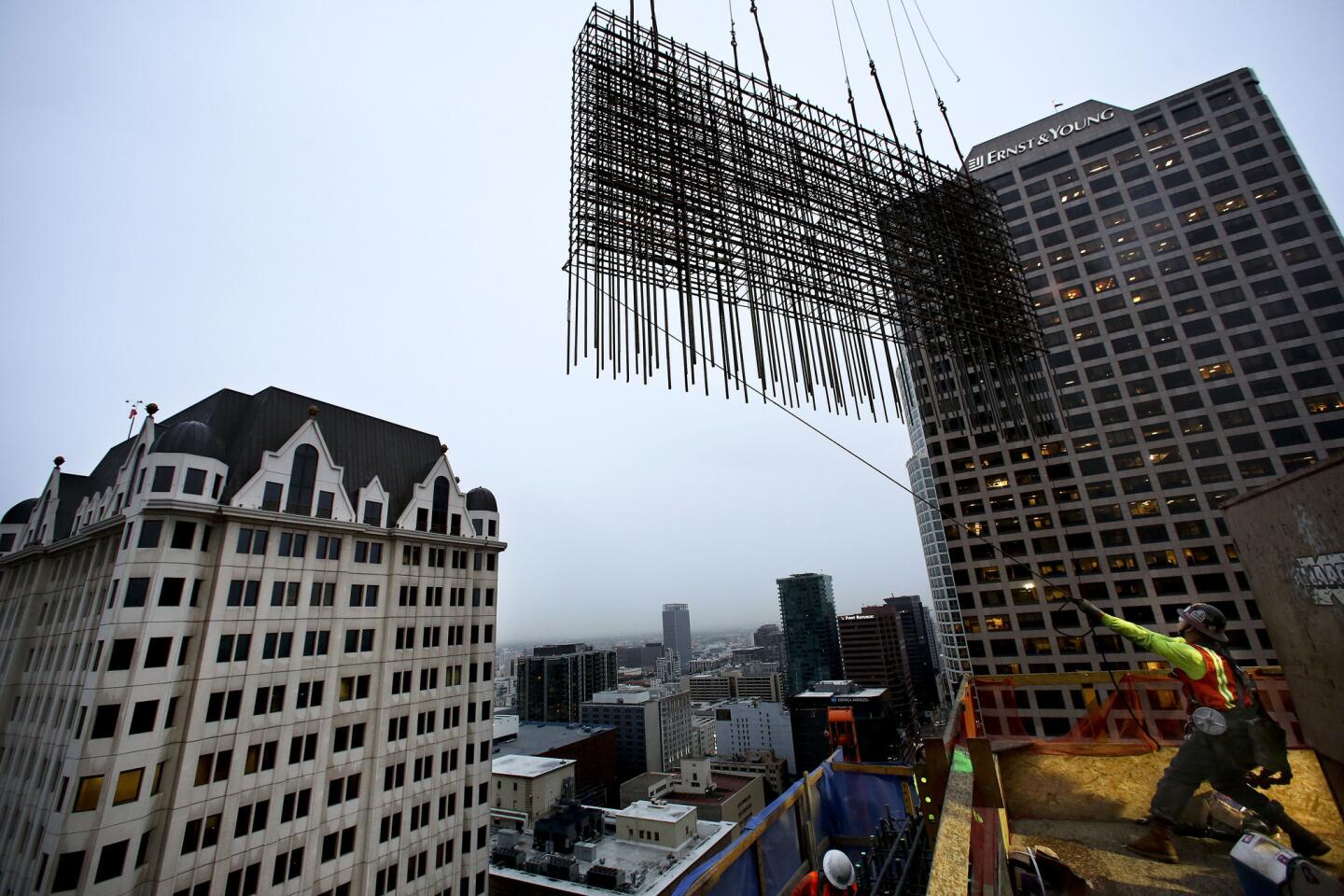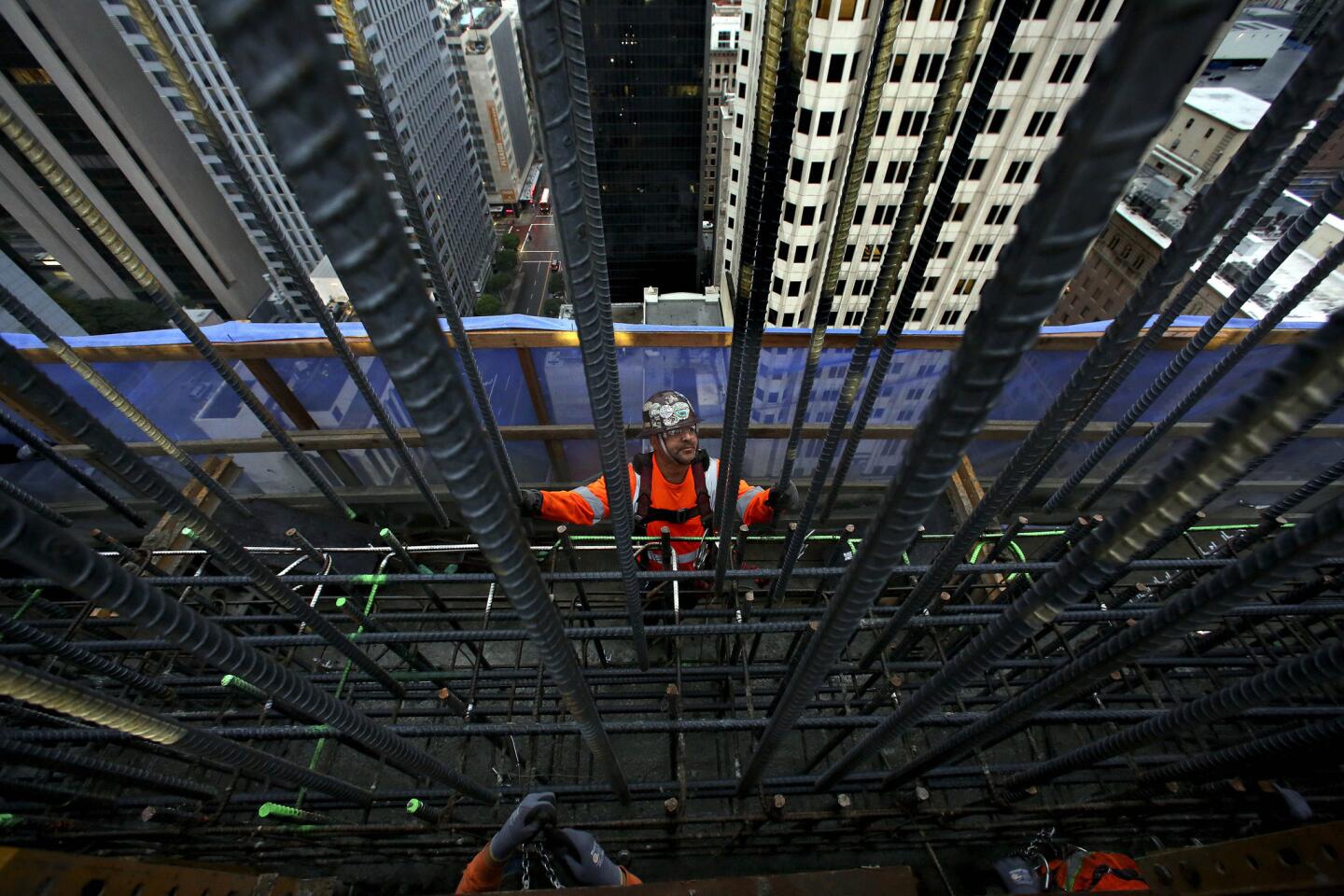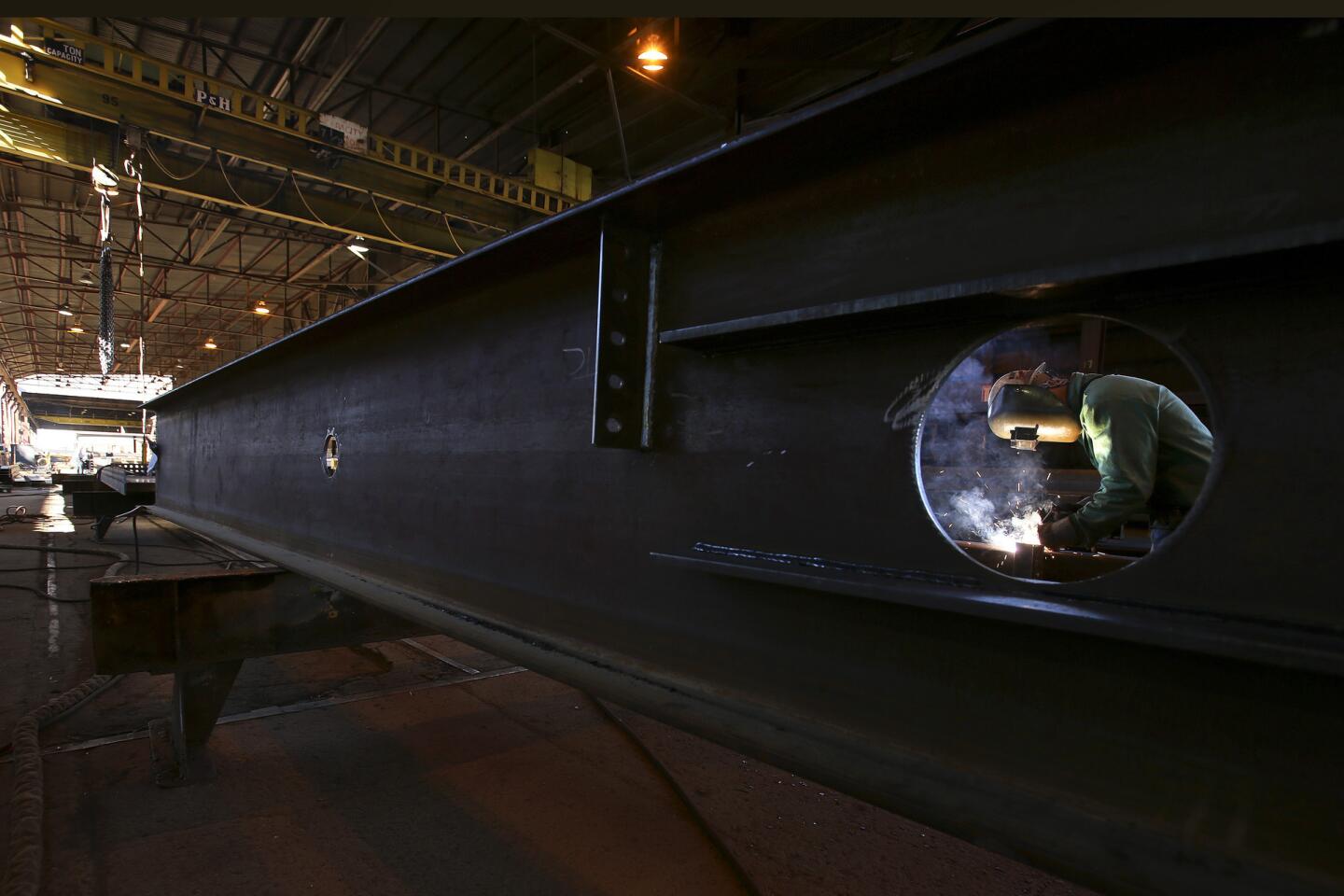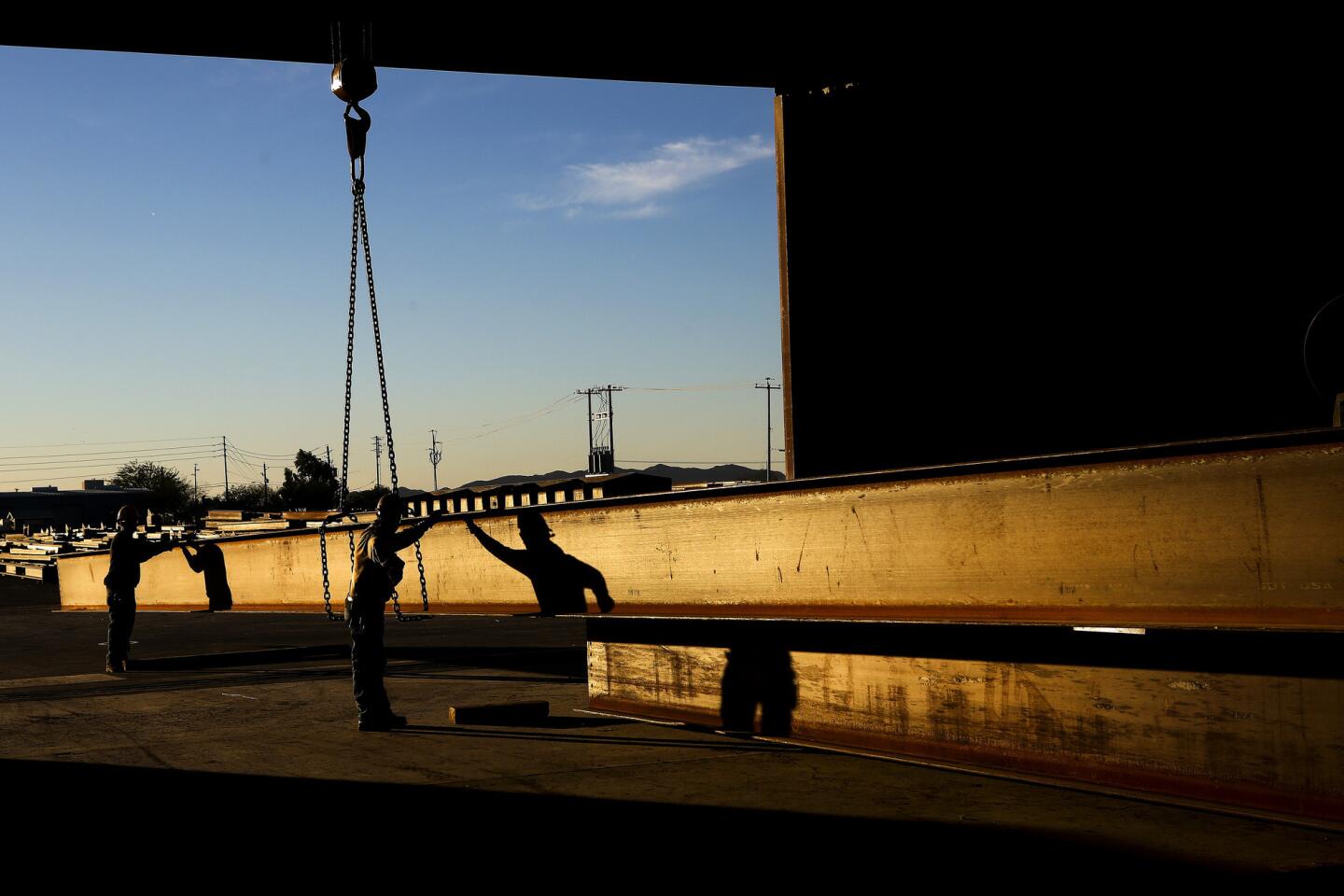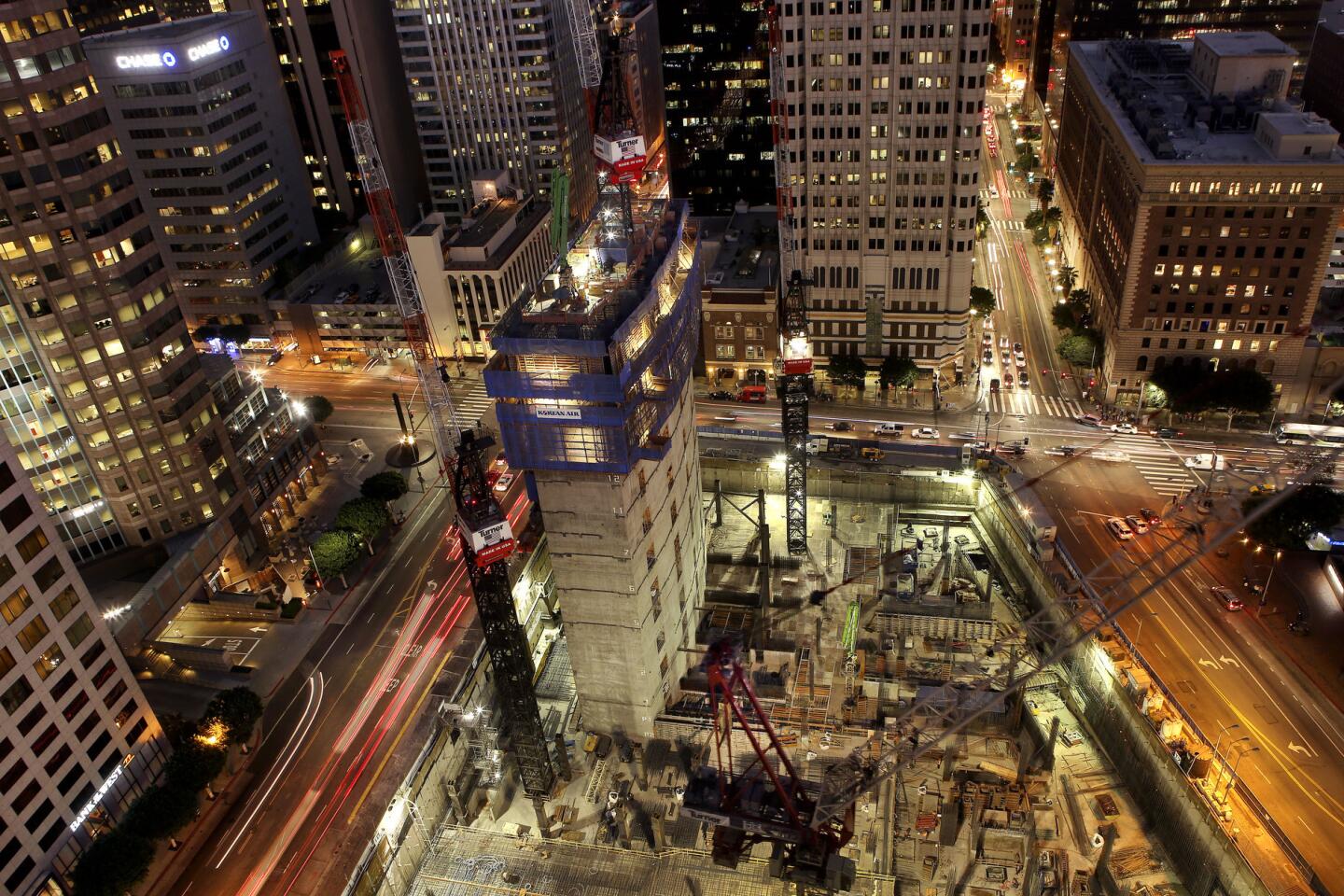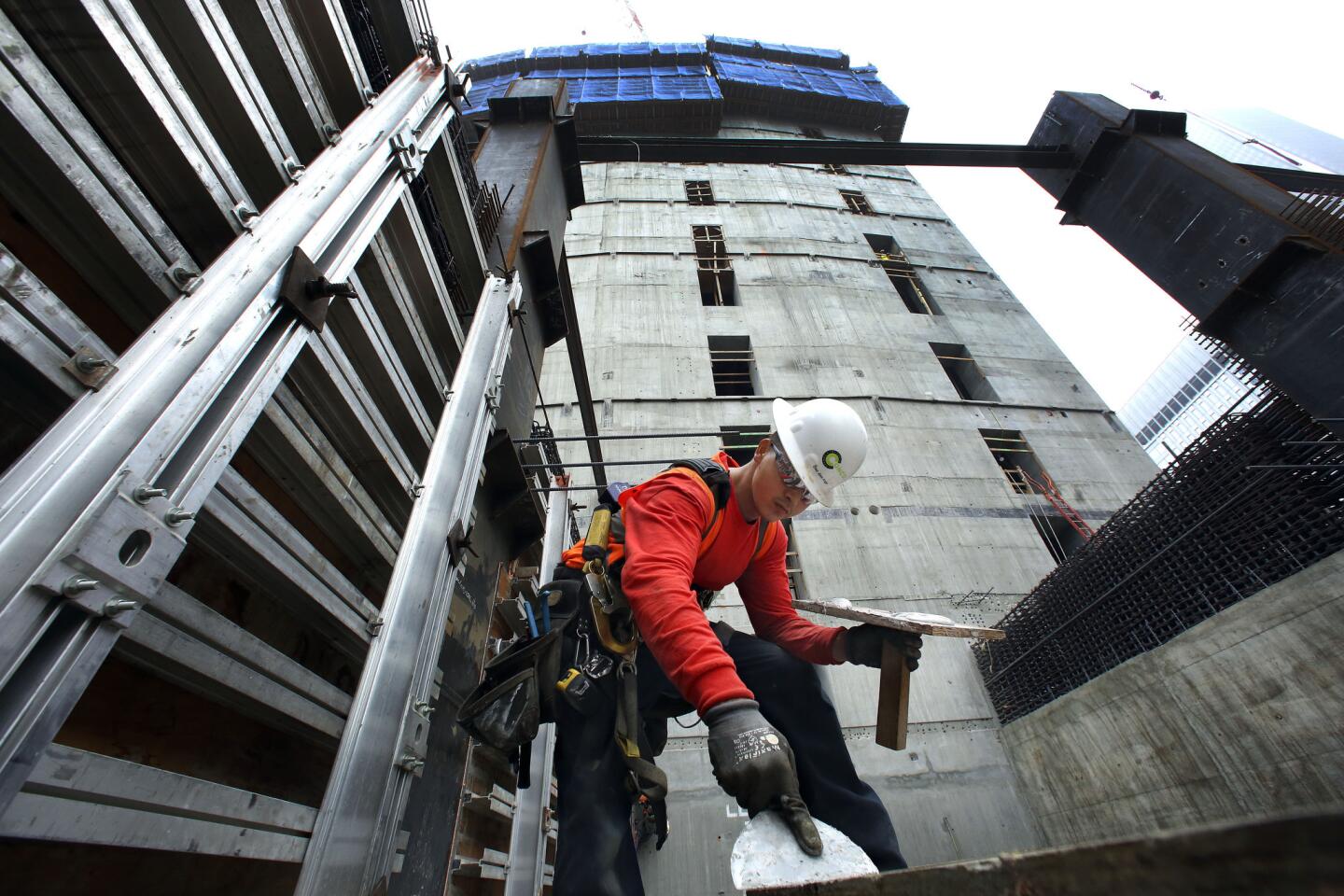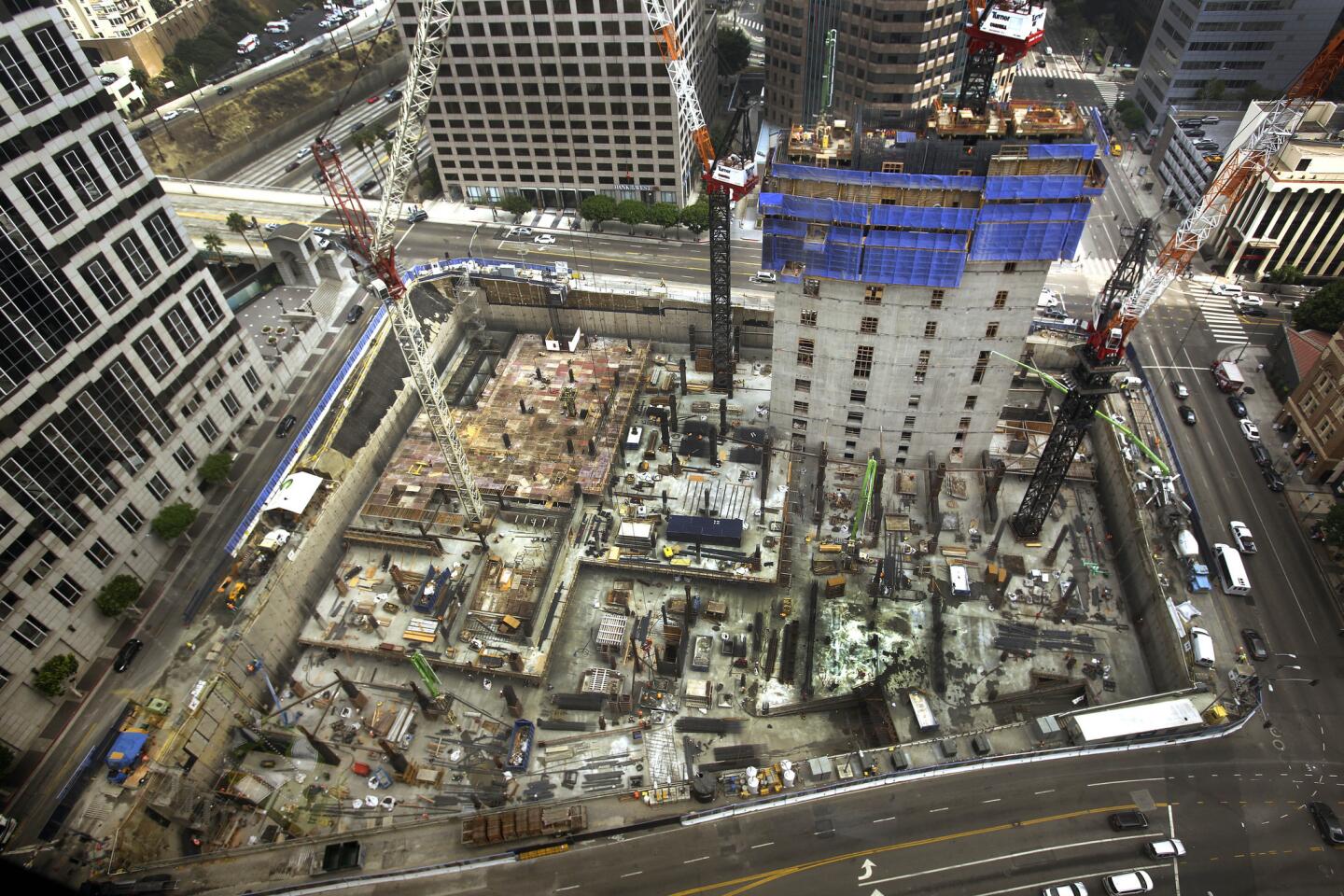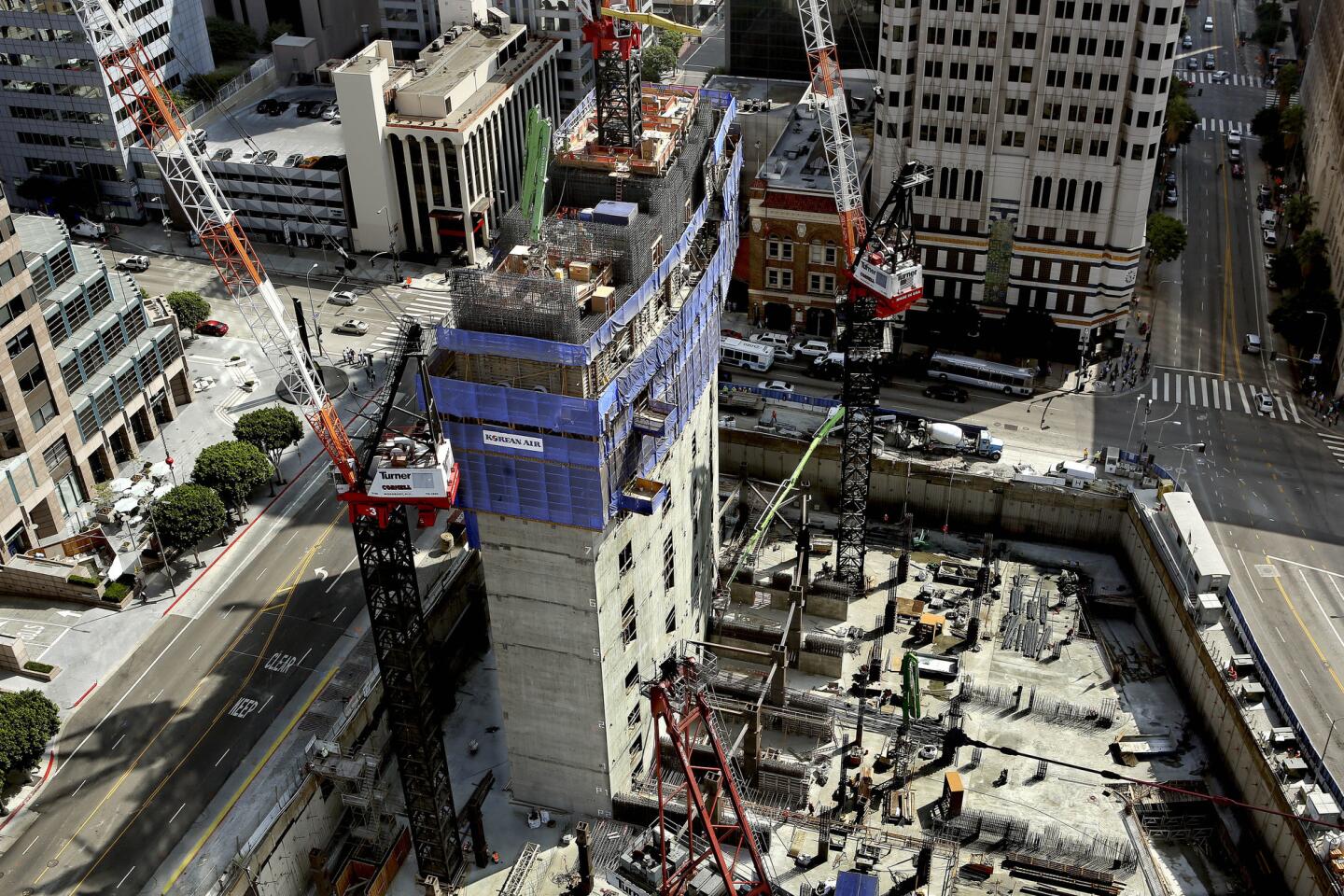Three-year Wilshire Grand build reaches a new milestone: ‘topping out’
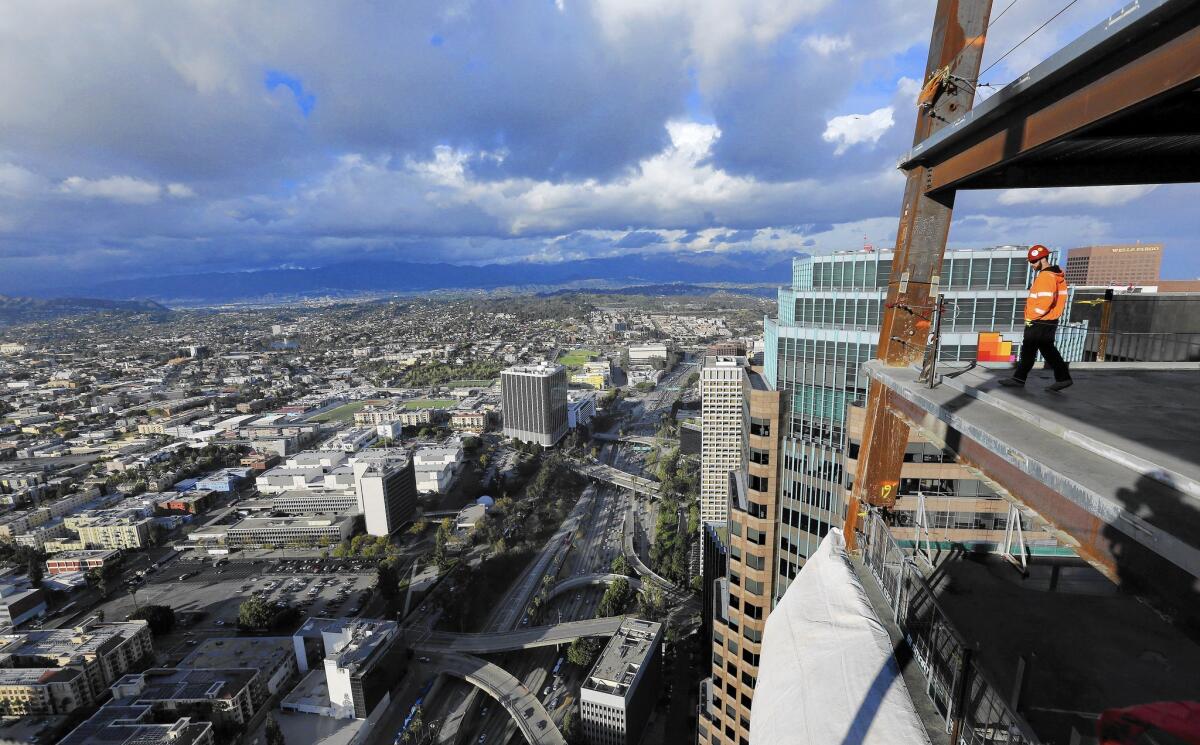
- Share via
Rick Smegelski pulled back the hoist lever with his right hand, calculating how fast his load was rising.
As operator of Tower Crane No. 1 at the construction site for the Wilshire Grand, Smegelski looks upon downtown Los Angeles from his cab, 900 feet above Figueroa Street. Below him stood the signature element of this $1-billion-plus project, the tower, soon to become the tallest structure west of Chicago.
“I’m getting toward the end of my career,” said Smegelski, 59. “So this building is a pretty big feather in my cap. This will be here forever. I can take my great-grandchildren here and show them that I built it.”
One day last week, Smegelski had a special audience, and though he couldn’t see or hear them, he knew applause was rising from the assembled dignitaries: architects, engineers, construction managers and representatives of the building’s owner, Korean Air.
“Hey up,” someone in the crowd shouted as the beam lifted by Tower Crane No. 1 cleared a latticework of steel that will one day support a skylight sweeping between the tower and adjoining ballrooms.
The 35-foot, 2,100-pound beam had been trucked in from Eloy, Ariz., and was tagged with signatures of the many people who had a piece of the project, from workers who poured the concrete foundation to executives who signed off on the plans.
Construction projects celebrate many milestones, especially ones as ambitious as the Wilshire Grand.
In 2013 came demolition of the 16-story hotel that once occupied this site. In 2014, workers poured the foundation, a marathon 18-hour event, and now this, the completion of the concrete core, the central pillar of the tower.
The ceremony, known as the “topping out,” is a tradition for high-rises and includes sending an American flag and a small fir tree to the highest point.
But Smegelski knew that the events below, complete with barbecue and speeches, was mostly symbolic.
Months of work lie ahead before the top of the building is complete: a steel and glass crown with a spire and beacon reaching to 1,100 feet. But still, the concrete core was a feat unto itself: 32,000 cubic yards of concrete and 50 million pounds of rebar rising 892-feet, 6-inches from the foundation.
Chris Martin, head of the architectural firm that designed the building, told the crowd that in one year — on March 8, 2017 — they will gather again to celebrate the end of construction.
His words were both a promise and a reminder not to let up. The date coincides with the birthday of Yang Ho Cho, chairman of Hanjin International Corp., which owns Korean Air.
Smegelski’s beam, rising at 600-feet per minute, took 90 seconds to reach the top. He depressed his right foot, and the crane rotated toward the ironworkers, who stood ready to wire and bolt it into place.
The work is nothing special, Smegelski said. “We do this all day long.”
For more than two years, the Wilshire Grand, rising from the bedrock of the city, has become the daily focus for these workers, and what seems chaotic and inconceivable to passers-by is for them both routine and ordinary.
“Humans get used to the weirdest things,” said Marc Turcot, a superintendent with Turner Construction Co., which is managing the work. “What you thought was impossible is now normal.”
When Turcot first came here in 2013, the Wilshire Grand presented challenges he had never encountered. The 2.8-acre city block was no bigger than a postage stamp, leaving little room to store materials. Negotiating the flow of trucks took the patience of an air-traffic controller, and downtown — its 24-hour ebb and flow — crowded in on all sides.
The trades had conflicts as they got to know their jobs, he said. But job sites like this provide a lesson in human nature.
“Construction has a way of finding the best ways of doing things just by putting people together,” he said. “At some point, you have to give in in order to move forward.”
Today, the Wilshire Grand is a hive of activity, bearing the hallmarks of an assembly line as workers — up to 14 trades and 47 locals — have on average four days to complete their jobs on each floor before moving to the next.
As the final yards of concrete were setting on the 73rd floor, finishing work had begun far below, where the space is hemmed in by windows, sheet-rock walls and the pre-fabricated bathrooms, shipped in from Madera, Calif., and lifted by crane onto each floor.
On the 31st floor, workers are putting the finishing touches on the first hotel room, and tenants are being courted for the nearly 400,000 square feet of office space in the 18 stories below.
But as prosaic as the work can be, the view from the top seldom disappoints. From the 66th floor, the city spreads out like a Berber carpet, each loop in the crowded fabric a home, an apartment or office building.
Far below, downtown’s public library’s four-sided tower is dwarfed by skyscrapers bearing the names of the city’s corporations. At eye-level, these declarations read like cryptic ephemera: AON, Deloitte, PWC, KMPG.
Johnny McCormack has watched this view evolve. He has spent the last two years directing the delivery of concrete into the walls, and each week, a little more of Southern California emerged.
“Everything just drops out from underneath you and you watch the city get smaller and smaller, lower and lower,” McCormack said. “Every week you would see different buildings and different pools.”
First, the parking lot at Dodger Stadium became clear, then the headlights of the morning commuters streaming down Kellogg Hill in San Dimas, and one day an island no one in his crew knew existed. They thought it might be a ship, but then they found it on Google maps.
It was Santa Barbara Island, just on the edge of the horizon, more than 30 miles away.
The workers mark the passage of time by the completion of their jobs. They have seen tradesmen come and go, first the rod-busters who fashioned the steel cages that support the concrete, and now the concrete workers, who are left with mostly patching work here and there.
They have felt seasonal winds rattle the core with 70-mph blasts, and they have memories associated with this place they will never shake.
When crane operator Smegelski looks back on his 28 months on site, he thinks about his friend and fellow crane operator Robert Manos.
Smegelski met Manos in Las Vegas on projects more than 10 years ago. They came to Los Angeles together, finding a trailer in Temple City, closer to the job site than their homes and families in Santa Ynez and Bakersfield.
Manos died last August after a short battle with a brain tumor. He was 47.
On his cellphone, Smegelski keeps a video in memory of Manos.
“All right, Robert,” says a voice over a shot of the construction site. “This is for you: a tribute from your fellow operators at the Wilshire Grand.”
A loud blast from the air horns on the each tower crane booms through downtown in honor of Manos.
This week, they found space on the beam for the name of a friend who couldn’t be here.
Twitter: @tcurwen
ALSO
L.A. weather outlook: Small chance of rain, then temperatures in the 80s
Digital First Media named top early bidder for the Orange County Register
Clippers rookie Branden Dawson is arrested on suspicion of felony spousal abuse
More to Read
Sign up for Essential California
The most important California stories and recommendations in your inbox every morning.
You may occasionally receive promotional content from the Los Angeles Times.
